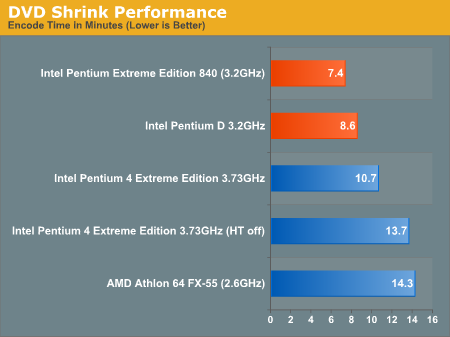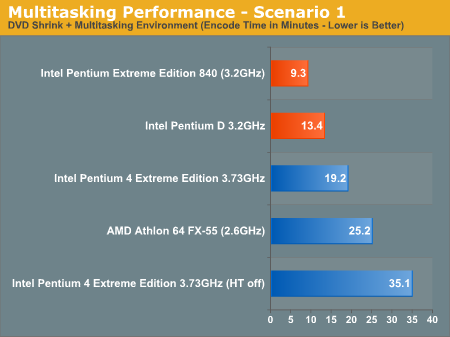Intel Dual Core Performance Preview Part I: First Encounter
by Anand Lal Shimpi on April 4, 2005 2:44 PM EST- Posted in
- CPUs
Multitasking Scenario 1: DVD Shrink
If you've ever tried to backup a DVD, you know that the process can take a long time. Just ripping the disc to your hard drive will eat up a good 20 minutes, and then there's the encoding. The encoding can easily take between 20 - 45 minutes depending on the speed of your CPU, and once you start doing other tasks in the background, you can expect those times to grow even longer.
For this test, we used DVD Shrink, one of the simplest applications available to compress and re-encode a DVD to fit on a single 4.5GB disc. We ran DVD Decrypt on the Star Wars Episode VI DVD so that we had a local copy of the DVD on our test bed hard drive (in a future version of the test, we may try to include DVD Decrypt performance in our benchmark as well). All of the DVD Shrink settings were left at default, including telling the program to assume a low priority, a setting many users check in order to be able to do other things while DVD Shrink is working.
As a single application with no multitasking involved, here's how DVD Shrink performs:

As you can see, the new dual core chips can shrink a DVD in about 70% of the time of the 3.73EE. But what happens to performance when you start doing other things in the background?
In order to find out, we did the following:
1) Open Firefox and load the following web pages in tabs (we used local copies of all of the web pages):
We kept the browser on the AT front page.
2) Open iTunes and start playing the latest album of avid AnandTech reader 50 Cent on repeat all.
3) Open Newsleecher.
4) Open DVD Shrink.
5) Login to our news server and start downloading headers for our subscribed news groups.
6) Start backup of Star Wars Episode VI - Return of the Jedi. All default settings, including low priority.
DVD Shrink was the application in focus; this matters because by default, Windows gives special scheduling priority to the application currently in the foreground (we will test what happens when it's not in the foreground later in this article). We waited until the DVD Shrink operation was complete and recorded its completion time. Below are the results:

Now, we start to see where dual core helps. In this relatively simple multitasking scenario, the DVD shrink task took more than twice as long on single core CPUs than it did on dual core chips. The Pentium 4 without Hyper Threading took a full 35 minutes to complete the task, compared to the 9.3 minutes of the dual core Pentium Extreme Edition. Even the fastest from AMD couldn't hold a candle to the dual core offerings.
And this was only with a minimal amount of multitasking. Had more applications been running or had actual user interaction taken place during the test, the dual vs. single core gap would've grown even more.










141 Comments
View All Comments
hosto - Tuesday, April 5, 2005 - link
#110 - did you notice better performance on the p4 that you used to have? because on single instance of firefox, the amd chips blow the p4's away....yet, when i have multiple panes open with my a64 it chugs quite nastily if there is flash content. Is there some way that macromedia have optimised the flash player for the P4 for firefox? i wonder if the same slowdowns would be noticeable with internet explorer, or if it is specific to the player in firefox/mozilla?xsilver - Tuesday, April 5, 2005 - link
#106I hope you mean in multithreaded apps, as has been said many times before... single threaded apps run the SAME, therefore no benchies were included
#108
So true --- its the only reason why I wish I still had my p4HT over the amd64
xsilver - Tuesday, April 5, 2005 - link
ANAND ... for your gaming benchmarks I recommend a scattering of commonly used programs1) the lot of antivirus, trillian, firefox, spyware running in background
2) gaming related stuff like teamspeak or an audio cd playing in the background (to drown out the crappy game music :)
any other gaming related stuff would be good too....
if dual core proves itself, there should be no performance drop, whereas the single core will drop somewhat
hosto - Tuesday, April 5, 2005 - link
thats funny the comment about the flash going slowly in firefox on the AMD processors in the benchmark..ive noticed the same on my athlon64 3200+ that i cannot have too many flash sites opening without it chugging.sprockkets - Tuesday, April 5, 2005 - link
this would be funny, but if simply having another core helps out with responsiveness and nothing else, I'm getting the dual VIA C3 mini-itx board hahahahaha!OK, not dual core, but hell, it's still small enough and they take only 7w each.
ksteele - Tuesday, April 5, 2005 - link
I would like to see some "apple to apple" benchmarks by removing the clock speed disparities.Pentium D 820 2.8Ghz versus Pentium 4 520 2.8Ghz
Pentium D 830 3.0Ghz versus Pentium 4 530 3.0Ghx
Pentium D 840 3.2Ghz versus Pentium 4 540 3.2Ghz
This will allow us to see the true benefit of dual cores without the speed differences.
mino - Tuesday, April 5, 2005 - link
sorry for some typpo'smino - Tuesday, April 5, 2005 - link
#101 and some othersYou'are mistaken, Inquirer is NOT to be compared to AT. Is is solely news/romours/opinions site and THAT IS THEY ARE BEST AT ! The practical(not theoretical as at CNN...)non-existence of censorship makes them what they are.
One thing for sure: they make biased and wrong stance against AT on this, but this is what they do almost all the time.
The beauty of The Inquirer's approach to journalism is that it let's the reader choose which report is to be taken seriously. They even state it in articles regularly.
I just hate those juornalists that usurp the right for correct judgement just for themselves.
Just to make clear: I'm in no relation to The Inq. except readeship.
To Anand:
This is one of the best articles(at all) a have read so far. And it looks like it's going to be even better when it's completed. Keep up the good work.
To topic: One thing should be noted. That is that the VERY poor performance at the singlecore(AMD & intel HT off) scenarios is NOT to be atributed to their inferiority but mostly to the incredibly crappy windows scheduler. Availability of multiple CPU's to it just partly hides its inefficiencies. Let's face it. HT is mainly a Windows baby. No way Intel would make the trouble developing it *NIX system were the main ones.
ksteele - Tuesday, April 5, 2005 - link
I noticed the dual core's have 1MB L2 cache. Does this mean they are 5xx based? Do they support Intel EM64T, XD Bit and Enhanced Intel Speedstep Technology?Gatak - Tuesday, April 5, 2005 - link
#83 So you do not think that a game can utilize two CPUs? Run physics and I/O on one Core and render 3D and textures on the other.Also, Even though a game is single threaded, you still have the OS in the background, you have the video and audio card drivers running in separate threads. harddisk I/O and interrupt handling is also spread out on multiple cores.